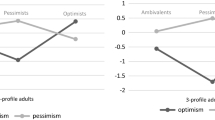Abstract
Optimism and pessimism are personality variables that have repeatedly been shown to affect health, job performance, and social relationships. Various instruments purport to measure these dispositions that differ substantially in their theoretical and measurement models. While research has examined relations between subsets of these measures, their unique predictive ability has been neglected. Three sequential studies evaluated the interrelation and predictive ability of the three most utilized instruments, the Life Orientation Test (LOT), the O/P Instrument (OPI) and variants of the Attributional Style Questionnaire (ASQ). Consistent with expectations, measures sharing a future-expectancy component (LOT and OPI) were moderately related and most predictive of health, depression, and coping. ASQ measures were modestly related to the LOT and OPI and offered less consistent predictions.
Similar content being viewed by others
References
Akaike, H. (1981). Factor analysis and AIC. Psychometrika, 52, 317–332.
Anderson, G. (1996). The benefits of optimism: A meta-analytic review of the Life Orientation Test. Personality and Individual Differences, 21, 719–725.
Beck, A.T., Rush, A.J., Shaw, B.F., & Emery, G. (1979). Cognitive therapy of depression. New York: Guilford Press.
Beck, A.T., Steer, R.A., & Garbin, M. (1988). Psychometric properties of the Beck Depression Inventory: Twenty-five years of evaluation. Clinical Psychology Review, 8, 77–100.
Bentler, P.M. (1990). Comparative fit indexes in structural models. Psychological Bulletin, 107, 238–246.
Browne, M.W., & Cudeck, R. (1993). Alternative ways of assessing model fit. In K.A. Bollen & J.S. Long (Eds.), Testing structural equation models (pp. 205–234). Newbury Park, CA: Sage Publications.
Carver, C.S., & Scheier, M. (1991). Unresolved issues regarding the meaning and measurement of explanatory style. Psychological Inquiry, 2, 21–24.
Carver, C.S., & Scheier, M. (2003). Optimism. In S.J. Lopez & C.R. Snyder (Eds.), Positive psychological assessment: A handbook of models and measures (pp. 75–89). Washington, DC: American Psychological Association.
Chang, E.C., D’Zurilla, T.J., & Maydeu-Olivares, A. (1994). Assessing the dimensionally of optimism and pessimism using a multimeasure approach. Cognitive Therapy and Research, 18, 143–161.
Chang, L., & McBride-Chang, C. (1996). The factor structure of the Life Orientation Test. Educational and Psychological Measurement, 56, 325–329.
Dember, W.N. (2001). The optimism-pessimism instrument: Personal and social correlates. In E.C. Chang (Ed.), Optimism and pessimism: Implications for theory, research, and practice (pp. 281–299). Washington, DC: American Psychological Association.
Dember, W.N., Martin, S.H., Hummer, M.K., Howe, S.R., & Melton, R.S. (1989). The measurement of optimism and pessimism. Current Psychology: Research & Reviews, 8, 109–119.
Epstein, S., & Meier, P. (1989). Constructive thinking: A broad coping variable with specific components. Journal of Personality and Social Psychology, 57, 332–350.
Hjelle, L., Belongia, C., & Nesser, J. (1996). Psychometric properties of the Life Orientation Test and Attributional Style Questionnaire. Psychological Reports, 78, 507–515.
Hull, J.G., & Mendolia, M. (1991). Modeling the relations of attributional style, expectancies, and depression. Journal of Personality & Social Psychology, 61, 85–97.
Lehman, J. (2001). Optimism, disengagement, and coping in early-stage breast cancer patients. Unpublished doctoral dissertation, University of Miami, Miami, FL.
Lin, E.H., & Peterson, C. (1990). Pessimistic explanatory style and response to illness. Behaviour Research and Therapy, 28, 243–248.
Peterson, C., & Bossio, L.M. (1991). Health and optimism. New York: Free Press.
Peterson, C., & Vaidya, R.S. (2001). Explanatory style, expectations, and depressive symptoms. Personality and Individual Differences, 31, 1217–1223.
Peterson, C., & Villanova, P. (1988). An expanded attributional style questionnaire. Journal of Abnormal Psychology, 97, 87–89.
Reilley, S.P., Geers, A.L., & Dember, W.N. (1997, June). “Purifying ” the O and P scales reduces their reliability and predictive ability. Poster session presented at the Annual Meeting of the American Psychological Society, Washington, DC.
Reivich, K., & Gillham, J. (2003). Learned optimism: The measurement of explanatory style. In S.J. Lopez & C.R. Snyder (Eds.), Positive psychological assessment: A handbook of models and measures (pp. 57–74). Washington, DC: American Psychological Association.
Robinson-Whelen, S., Kim, C., & MacCallum, R. C. (1997). Distinguishing optimism from pessimism in older adults: Is it more important to be optimistic or not to be pessimistic? Journal of Personality & Social Psychology, 73, 1345–1353.
Roysamb, E., & Strype, J. (2002). Optimism and pessimism: Underlying structure and dimensionality. Journal of Social & Clinical Psychology, 21, 1–19.
Scheier, M.F., & Carver, C.S. (1985). Optimism, coping, and health: Assessment and implications of generalized outcome expectancies. Health Psychology, 4, 219–247.
Scheier, M.F., & Carver, C.S. (1992). Effects of optimism on psychological and physical well being: Theoretical overview and empirical update. Cognitive Therapy and Research, 16, 201–228.
Scheier, M.F., Carver, C.S., & Bridges, M.W. (1994). Distinguishing optimism from neuroticism (and trait anxiety, self-mastery, and self-esteem): A reevaluation of the Life Orientation Test. Journal of Personality and Social Psychology, 67, 1063–1078.
Schinka, J.A. (1984). Health Problems Checklist. Miami, FL: Psychological Assessment Resources, Inc.
Sedikides, C. (1992). Mood as a determinant of attentional focus. Cognition & Emotion, 6, 129–148.
Seligman, M.E.P. (1990). Learned optimism. New York: Knopf.
Seligman, M.E.P. (2002). Positive psychology, positive prevention, and positive therapy. In C.R. Snyder & S. J. Lopez (Eds.), Handbook of positive psychology (pp. 3–12). London: Oxford University Press.
Seligman, M.E.P., Abramson, L.Y., Semmel, A., & von Baeyer, C. (1979). Depressive attributional style. Journal of Abnormal Psychology, 88, 242–247.
Steiger, J.H., & Lind, J.M. (1980, June). Statistically based tests for the number of common factors. Paper presented at the annual meeting of the Psychometric Society, Iowa City, IA.
Tanowitz, M. (2002). Cognitive and emotional responses to cancer threat: An experimental model. Unpublished doctoral dissertation, Yeshiva University, New York.
Weiner, B. (1985). An attributional theory of achievement motivation and emotion. Psychological Review, 92, 548–573.
Wilcox, R.R. (1998). How many discoveries have been lost by ignoring modern statistical methods? American Psychologist, 53, 300–314.
Author information
Authors and Affiliations
Corresponding author
Rights and permissions
About this article
Cite this article
Reilley, S.P., Geers, A.L., Lindsay, D.L. et al. Convergence and predictive validity in measures of optimism and pessimism: Sequential studies. Curr Psychol 24, 43–59 (2005). https://doi.org/10.1007/s12144-005-1003-z
Issue Date:
DOI: https://doi.org/10.1007/s12144-005-1003-z




